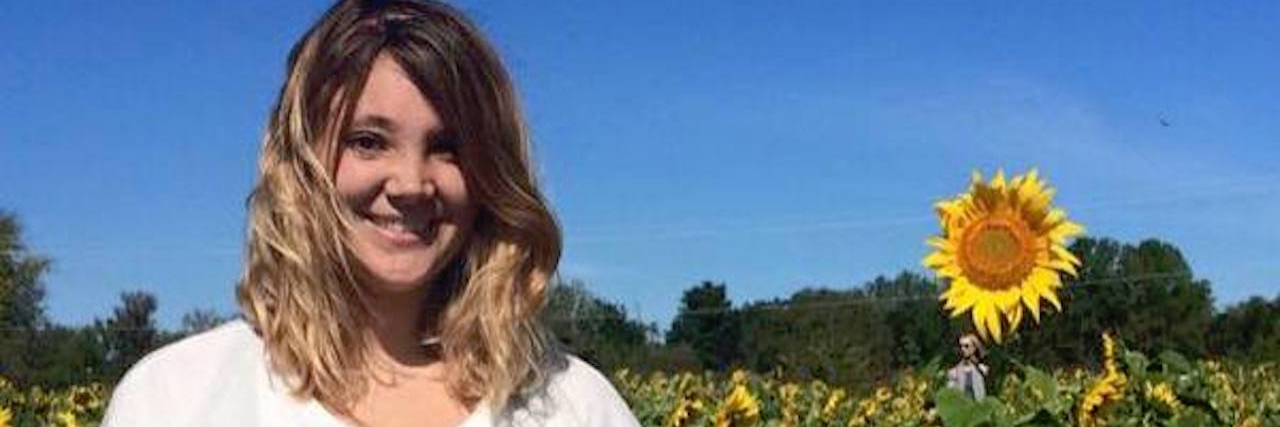Growing up, I had severe migraines. We didn’t know why; we just assumed it was nothing, and I went on with life. We all started to notice my right eye was lower then my left. Knowing this was an incredibly sensitive subject for me. My family thought it was simply a lazy eye.
In January 2007, that all changed. A doctor did a biopsy of the bone just above my right eye. The results came back to be fibrous dysplasia, a rare bone disorder that eats away healthy bone and replaces it with fibrous tissue. In March 2007, I had my first facial reconstructive surgery. For this surgery, they cut me from ear to ear, pulled my face down and shaved back the fibrous dysplasia. They also took a piece of my rib and built me a brand new eye socket.
We hoped this would be a great fix, and I could go back to life as if nothing had happened. That’s when I lost my first set of “friends.”
In order for me to go back to school, I had to compromise by going to the nurses’ office and taking short naps throughout the day to make sure that I wasn’t overworking myself. Even though I hated this, I did it. Anything to be back at school with my friends, right?
Soon, I began hearing hurtful things like how I faked it all, that I was just being a baby, that there obviously wasn’t anything wrong with me and that I didn’t deserve to take short naps and just wanted attention. And these were my “friends” saying this.
Thank you to my sixth-grade “friends” who taught me my first important lesson in life: That some people just aren’t good enough for my love.
Flash-forward to high school, where the bullying only got worse. It didn’t take long for other students to notice my slightly lowered eye and the small bald spot from my surgery when I was in sixth grade. Being tall, tan and blonde, I was the perfect target for being called Barbie. But I want to thank the girls who called me a f”***ed up Barbie,” because you gave me confidence and made me proud to look like the way I am.
By the end of freshman year, it wasn’t just girls bullying me — it was guys, too. They called me “Scarface” and said I was scary. Thank you to those boys who made me proud to show off my scars. Thank you for making it easier to explain why I was “Scarface.”
When I had my second reconstructive surgery, I was an adult who had to go grocery shopping and had bills to pay. My grandmother forced me to get into a wheelchair so I didn’t have to walk around Walmart. To the greeter at Walmart who laughed at me for having to be pushed around in a wheelchair: Thank you. You — and my grandmother — helped me accept that it’s OK not to be able to do it all. It’s OK that I just had major surgery and couldn’t function the same as I used to. Thank you for helping me understand myself and my limitations.
When I had my third reconstructive surgery, I was a new mother and a new(ish) wife, and I had to get groceries. Thank you to those who glared at me for having to use the motorized wheelchair (while holding my 1-month-old) to grocery shop. You helped me realize that even though I have limitations, they’re nothing to be ashamed of. I was embarrassed to use the motorized wheelchair at the beginning of my grocery trip, but by the end of it, I had my head held high. Thank you for helping me get to that point.
The burden of having a chronic illness is hard, not just on the patient, but also on the family and friends of the patients. The one good thing that comes out of having such a rare disease is connecting with other people who have it, and finding out who will always be there for you and who never was.
So to all the bullies I had growing up, although you didn’t make it easy for me to accept that I have fibrous dysplasia, I truly thank you for helping me find myself. Thank you for teaching me to be proud of my scars. Thank you for giving me the confidence to say I earned my scars, and I am proud to show them off and tell you how I got them.
Thank you for making fun of me. Thank you for calling me names. Thank you for molding me into the confident person I am today.
And yes, I do forgive you.

The Mighty is asking the following: What’s one thing people might not know about your experience with disability and/or disease, and what would you say to teach them? If you’d like to participate, please send a blog post to community@themighty.com. Please include a photo for the piece, a photo of yourself and 1-2 sentence bio. Check out our Submit a Story page for more about our submission guidelines.

